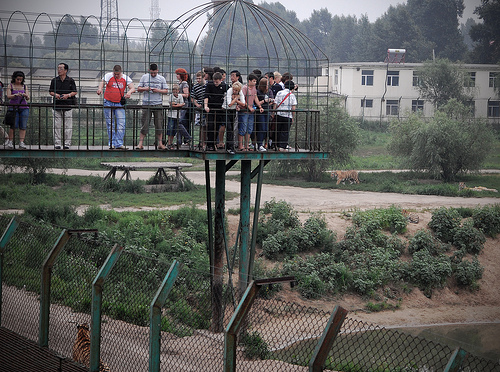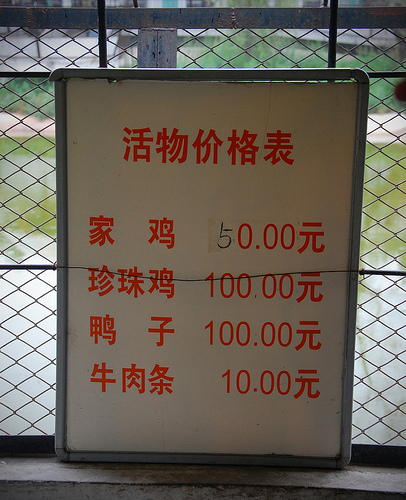Check out our Top Rewards Cards to boost your points earning and travel more!
Peter Conn’s teaching romp through China. Check out parts 2, 3, and 4.
The Rapid Traveler slides offstage for a man with true facility in the English language. University of Pennsylvania English professor Peter Conn is widely published (Amazon author profile) and well-traveled. He generously contributes his astute, hilarious notes from his summer teaching tour to China. This is a special treat for those with a curiosity in China and for those who enjoy erupting in laughter. His journey begins today in Changchun:
Changchun
You will find Changchun in the northeast corner of your map. I spent a couple of hours at an interesting place today: the imperial palace of Pu-yi when he was Japan’s puppet emperor. Changchun, I did not know, was the capital of Manchukou. Lots of compelling old photos of Pu-yi, his wife and four secondary wives, and his Japanese handlers. Nice gardens. English guide kept referring to “traitor” Pu-yi and “treacherous” Pu-yi. Chiang Kai-shek is treated better than that in the presidential palace museum in Nanjing.
Cynicism and irony about the government run rampant. There was an old joke out of the Soviet Union: you pretend to work and we’ll pretend to pay you. The Chinese version: you pretend to believe what we tell you and we’ll pretend to believe that you believe us. Citizens [sic] are allowed to say whatever they want in private — the informers of the bad old days are gone, and my conversations are hilarious — but nobody can print or broadcast even slight criticism.
What’s in a name?
Sunday I gave the keynote talk at the annual conference of the Chinese American literature association, this year at Jilin University in Changchun. The rector, a genial round man who allegedly spoke good English, introduced me at some length in Chinese. I dozed through it, since I understood not a word — except my own name, uttered in English: Peter Pan. The first time this happened I started out of my stupor with amusement. Was it deliberate? A small Chinese joke? The second and third time I peered at the audience of 80 or so to see if anyone reacted. Nada, zilch. Were they all asleep in the over-warm hall? Was their English as bad as his? Had they noticed but were afraid to react for fear of arousing the rector’s wrath? When I get back to the US, I am changing my name legally from Zachary Peters to Peter Pan.
Changchun to Harbin (via a small detour)
Soon thereafter I departed by train for (I thought) Harbin. In fact, after fifteen hours in a “sleeper” car from the 1930s, which ground to a creaking stop in every small village in northeast China, I found myself in a place called Mudanjiang, five hours beyond Harbin, and not far from the Russian border. Without telling me, my always solicitous hosts had decided that I would like to visit a famous lake in that area. I have rarely been so . . . . surprised (to use a mild term). So I was then driven another two hours to see the famous lake, which is mediocre: a nice place to be sure, but ruined by tacky hotels and tourist kitsch. (I have a photo of the gaudy hotel in which Kim Jung-Il stayed on his most recent visit.) Still, the boat ride on the lake provided some relief from the heat.
Next morning, the good souls in Mudanjiang took me to the nationally famous Tiger Park, purportedly the largest collection of Siberian tigers in the world. (I stopped counting at 65.)
The trip up to the park was splendid: a cool morning and endless miles of absolutely untouched mountain / forest landscape. The visit began with a drive through the park, a thrilling experience as these magnificent animals loped around the van and approached fairly closely to our barred windows. Then I noticed something odd: a live, foot-trussed chicken being lowered from the high branches of a tree. I figured out but did not believe what was about to happen. The chicken’s descent ended about 18 feet from the ground, The ten seconds or so that followed were silent save for the squawking of the chicken (had his dim wits concluded what was about to happen?). In the most explosive burst of speed I have ever seen, a huge tiger hurtled across forty yards or so of grassland, leapt up the tree and devoured the chicken in two gargantuan bites. He turned to us, still clinging to the inclined trunk of the tree, as if he expected applause, jaws still working and a couple of chicken feathers floating pathetically to the ground. Then he dropped gracefully to the turf and walked slowly to a further corner.
Needless to say, I was stunned. Perhaps because the whole thing seemed so cruel and unnecessary. Perhaps because I had immediately identified with the Chicken in this encounter. Others of more robust spirit might have seen themselves in the Tiger, but not me. My name is Chicken. I tried to temper my moral repugnance by acknowledging that this episode ranked pretty low on the inhumanity scorecard: compared, say, with bear-baiting in Renaissance Europe, bull-fighting in Spain, cock-fighting in Latin America, and all sorts of other depredations, not to mention what people do to people. But I remain both dismayed and (I confess it) dazzled by that tiger.
I also detected a macabre humor in the situation: I had been given the privilege of witnessing the might of the legendary Siberian chicken-eating tiger. What would Kipling say? Or Orwell?
Then goodbyes at the university, with the usual gift-giving. I was presented with several vials of “essence of bear gall bladder.” (I am not making any of this up.) In her solemn speech, the female vice-president told me that this potion was good for “heart, liver, hangover, and restoring male virility.” I chose to believe that this was a boilerplate, standardized public service announcement, not a personal comment, so responded with an impressively treacly thank-you.
Then the westbound train to Harbin (remember Harbin?). I provided a good deal of amusement for the other passengers when I swarmed up the tiny ladder to my upper berth. I believe I heard several muttering in Mandarin the exchange between Hamlet and Polonius as they study the clouds:
Hamlet: “Methinks a whale?”
Polonius: “Very like a whale, my lord”
A six-hour journey (nine hours less than my earlier northward trek). The heat was oppressive. Fortunately, the Party, in its compassion, had installed a large fan. Unfortunately, it didn’t work. I catnapped as I could, though without much success. The engineer enjoyed tootling his very loud tootler every fifteen minutes or so, even when we seemed to be in the middle of nowhere. Those jolts of noise punctuated the interminable conversations around and below me. The Chinese voice in its higher registers (specifically — forgive me — the female voice), at top speed and full volume, sounds to the untutored American ear a good deal like an old-fashioned dental drill, with two or three times the boring capacity. Such a woman was among my half-dozen companions in our little cell (correction: cabin). Her musicality alternated with the honking of a peddler who pushed his inedible sticky snacks up and down the corridor for all six hours, crying out to each cabin in turn. The raveled sleeve of my care was not much knit up (as it were).
I arrived in Harbin more or less intact. Left to myself for a few minutes in the lobby of my hotel, I was approached by an elegantly dressed young man who approached with a confiding smile and asked in a low tone: “want young girl?” I drew myself up to my full height, called him several hard names and told him to get out and take his nasty proposition with him. He did not budge an inch nor did his expression change throughout my tirade. When the storm seemed to him to have blown over, he leaned toward me and asked: “want young boy?” What can you say to that, except that this trip is proving to be un-dull.
Text by Peter Conn © 2011, all rights reserved, reprinted with permission. Reference hyperlinks and images selected by The Rapid Traveler, images licensed under Creative Commons.
Check Out Our: Top Rewards Cards ¦ Newsletter ¦ Twitter ¦ Facebook ¦ Instagram


